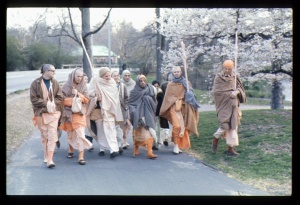SB 10.62.2: Difference between revisions
m (1 revision(s)) |
(Vanibot #0018 edit: make synonym terms in Sanskrit italic in SB - Vanisource) |
||
| Line 1: | Line 1: | ||
{{info | {{info | ||
|speaker= | |speaker=Śukadeva Gosvāmī | ||
|listener= | |listener=King Parīkṣit | ||
}} | }} | ||
[[Category:Srimad-Bhagavatam - Canto 10 Chapter 62|s02]] | |||
[[Category:Bhagavatam Verses Spoken by Sukadeva Gosvami - Vanisource|106202]] | |||
<div style="float:left">'''[[Srimad-Bhagavatam]] - [[SB 10|Tenth Canto]] - [[SB 10.62: The Meeting of Usa and Aniruddha|Chapter 62: The Meeting of Ūṣā and Aniruddha]]'''</div> | |||
<div style="float:right">[[File:Go-previous.png|link=SB 10.62.1]] '''[[SB 10.62.1]] - [[SB 10.62.3]]''' [[File:Go-next.png|link=SB 10.62.3]]</div> | |||
{{RandomImage}} | |||
{{SBnotice}} | |||
==== TEXT 2 ==== | ==== TEXT 2 ==== | ||
<div | <div class="verse"> | ||
śrī-śuka uvāca | :śrī-śuka uvāca | ||
bāṇaḥ putra-śata-jyeṣṭho | :bāṇaḥ putra-śata-jyeṣṭho | ||
baler āsīn mahātmanaḥ | :baler āsīn mahātmanaḥ | ||
yena vāmana-rūpāya | :yena vāmana-rūpāya | ||
haraye 'dāyi medinī | :haraye 'dāyi medinī | ||
tasyaurasaḥ suto bānaḥ | |||
śiva-bhakti-rataḥ sadā | :tasyaurasaḥ suto bānaḥ | ||
mānyo vadānyo dhīmāṁś ca | :śiva-bhakti-rataḥ sadā | ||
satya-sandho dṛḍha-vrataḥ | :mānyo vadānyo dhīmāṁś ca | ||
śoṇitākhye pure ramye | :satya-sandho dṛḍha-vrataḥ | ||
sa rājyam akarot purā | :śoṇitākhye pure ramye | ||
tasya śambhoḥ prasādena | :sa rājyam akarot purā | ||
kiṅkarā iva te 'marāḥ | |||
sahasra-bāhur vādyena | :tasya śambhoḥ prasādena | ||
tāṇdave 'toṣayan mṛḍam | :kiṅkarā iva te 'marāḥ | ||
:sahasra-bāhur vādyena | |||
:tāṇdave 'toṣayan mṛḍam | |||
</div> | </div> | ||
| Line 28: | Line 35: | ||
==== SYNONYMS ==== | ==== SYNONYMS ==== | ||
<div | <div class="synonyms"> | ||
śrī-śukaḥ | ''śrī-śukaḥ uvāca''—Śukadeva Gosvāmī said; ''bāṇaḥ''—Bāṇa; ''putra''—of sons; ''śata''—one hundred; ''jyeṣṭhaḥ''—the oldest; ''baleḥ''—of Mahārāja Bali; ''āsīt''—was; ''mahā-ātmanaḥ''—of the great soul; ''yena''—by whom (Bali); ''vāmana-rūpāya''—in the form of the dwarf, Vāmanadeva; ''haraye''—to the Supreme Lord Hari; ''adāyi''—was given; ''medinī''—the earth; ''tasya''—his; ''aurasaḥ''—from the semen; ''sutaḥ''—the son; ''bāṇaḥ''—Bāṇa; ''śiva-bhakti''—in devotion for Lord Śiva; ''rataḥ''—fixed; ''sada''—always; ''mānyaḥ''—respectable; ''vadānyaḥ''—magnanimous; ''dhī-man''—intelligent; ''ca''—and; ''satya-sandhaḥ''—truthful; ''dṛḍha-vrataḥ''—firm in his vows; ''śoṇita-ākhye''—known as Śoṇita; ''pure''—in the city; ''ramye''—charming; ''saḥ''—he; ''rājyam akarot''—made his kingdom; ''purā''—in the past; ''tasya''—upon him; ''śambhoḥ''—of Lord Śambhu (Śiva); ''prasādena''—by the pleasure; ''kinkarāḥ''—servants; ''iva''—as if; ''te''—they; ''amarāḥ''—the demigods; ''sahasra''—one thousand; ''bāhuḥ''—having arms; ''vādyena''—with the playing of musical instruments; ''tāṇḍave''—while he (Lord Śiva) was dancing his tāṇḍava-nṛtya; ''mṛḍam''—Lord Śiva. | ||
</div> | </div> | ||
{{SBcollapse}} | |||
==== TRANSLATION ==== | ==== TRANSLATION ==== | ||
<div | <div class="translation"> | ||
Śukadeva Gosvāmī said: Bāṇa was the oldest of the hundred sons fathered by the great saint Bali Mahārāja, who gave the whole earth in charity to Lord Hari when He appeared as Vāmanadeva. Bāṇāsura, born from Bali's semen, became a great devotee of Lord Śiva. His behavior was always respectable, and he was generous, intelligent, truthful and firm in his vows. The beautiful city of Śoṇitapura was under his dominion. Because Lord Śiva had favored him, the very demigods waited on Bāṇāsura like menial servants. Once, when Śiva was dancing his tāṇḍava-nṛtya, Bāṇa especially satisfied the lord by playing a musical accompaniment with his one thousand arms. | Śukadeva Gosvāmī said: Bāṇa was the oldest of the hundred sons fathered by the great saint Bali Mahārāja, who gave the whole earth in charity to Lord Hari when He appeared as Vāmanadeva. Bāṇāsura, born from Bali's semen, became a great devotee of Lord Śiva. His behavior was always respectable, and he was generous, intelligent, truthful and firm in his vows. The beautiful city of Śoṇitapura was under his dominion. Because Lord Śiva had favored him, the very demigods waited on Bāṇāsura like menial servants. Once, when Śiva was dancing his tāṇḍava-nṛtya, Bāṇa especially satisfied the lord by playing a musical accompaniment with his one thousand arms. | ||
</div> | </div> | ||
__NOTOC__ | </div> | ||
</div> | |||
<div style="float:right">[[File:Go-previous.png|link=SB 10.62.1]] '''[[SB 10.62.1]] - [[SB 10.62.3]]''' [[File:Go-next.png|link=SB 10.62.3]]</div> | |||
__NOTOC__ | |||
__NOEDITSECTION__ | |||
Revision as of 17:34, 1 December 2017

A.C. Bhaktivedanta Swami Prabhupada
Please note: The synonyms, translation and purport of this verse were composed by disciples of Śrīla Prabhupāda
TEXT 2
- śrī-śuka uvāca
- bāṇaḥ putra-śata-jyeṣṭho
- baler āsīn mahātmanaḥ
- yena vāmana-rūpāya
- haraye 'dāyi medinī
- tasyaurasaḥ suto bānaḥ
- śiva-bhakti-rataḥ sadā
- mānyo vadānyo dhīmāṁś ca
- satya-sandho dṛḍha-vrataḥ
- śoṇitākhye pure ramye
- sa rājyam akarot purā
- tasya śambhoḥ prasādena
- kiṅkarā iva te 'marāḥ
- sahasra-bāhur vādyena
- tāṇdave 'toṣayan mṛḍam
SYNONYMS
śrī-śukaḥ uvāca—Śukadeva Gosvāmī said; bāṇaḥ—Bāṇa; putra—of sons; śata—one hundred; jyeṣṭhaḥ—the oldest; baleḥ—of Mahārāja Bali; āsīt—was; mahā-ātmanaḥ—of the great soul; yena—by whom (Bali); vāmana-rūpāya—in the form of the dwarf, Vāmanadeva; haraye—to the Supreme Lord Hari; adāyi—was given; medinī—the earth; tasya—his; aurasaḥ—from the semen; sutaḥ—the son; bāṇaḥ—Bāṇa; śiva-bhakti—in devotion for Lord Śiva; rataḥ—fixed; sada—always; mānyaḥ—respectable; vadānyaḥ—magnanimous; dhī-man—intelligent; ca—and; satya-sandhaḥ—truthful; dṛḍha-vrataḥ—firm in his vows; śoṇita-ākhye—known as Śoṇita; pure—in the city; ramye—charming; saḥ—he; rājyam akarot—made his kingdom; purā—in the past; tasya—upon him; śambhoḥ—of Lord Śambhu (Śiva); prasādena—by the pleasure; kinkarāḥ—servants; iva—as if; te—they; amarāḥ—the demigods; sahasra—one thousand; bāhuḥ—having arms; vādyena—with the playing of musical instruments; tāṇḍave—while he (Lord Śiva) was dancing his tāṇḍava-nṛtya; mṛḍam—Lord Śiva.
Translation and purport composed by disciples of Śrīla Prabhupāda
TRANSLATION
Śukadeva Gosvāmī said: Bāṇa was the oldest of the hundred sons fathered by the great saint Bali Mahārāja, who gave the whole earth in charity to Lord Hari when He appeared as Vāmanadeva. Bāṇāsura, born from Bali's semen, became a great devotee of Lord Śiva. His behavior was always respectable, and he was generous, intelligent, truthful and firm in his vows. The beautiful city of Śoṇitapura was under his dominion. Because Lord Śiva had favored him, the very demigods waited on Bāṇāsura like menial servants. Once, when Śiva was dancing his tāṇḍava-nṛtya, Bāṇa especially satisfied the lord by playing a musical accompaniment with his one thousand arms.